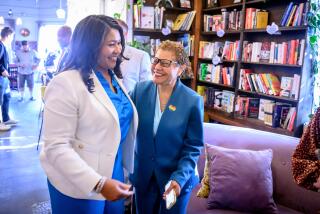Heâs a Public Servant, and Heâd Do It Again
The year was 1965. The Vietnam War was escalating, Watts was about to explode and a Brentwood businessman named Marvin Braude was elected to the Los Angeles City Council.
Thirty-one years later, nobody at City Hall has cast as many votes and witnessed as much history.
So after the 76-year-old Braude announced last week that he would not seek a ninth term and would leave office next summer, he had plenty to say. Key supporters received a five-page letter explaining his decision and listing his accomplishments. He ended it with a subtle note of defiance in cynical times.
âI still think elected office is the highest calling.â
*
Marvin Braude is too candid to indulge in false modesty. It may be popular to think of politics as a grubby enterprise populated by easily corruptible souls. Braude suggests that politics should be a noble pursuit of high ideals and that he pursued his nobly.
This may seem quaint, but thatâs Braude. He was never the most gifted politician in town; he often sounds like a scolding professor. But he earned a reputation for practicing politics to serve his convictions, not the other way around.
He suggested lunch in Little Tokyo and we wound up at a place that features karaoke at night. The image of Braude crooning âMy Wayâ came to mind.
Regrets? Too few to mention. When Braude joined the City Council, he was considered something of an ecology kook on a pro-growth panel. Often heâd be the lone naysayer. But as the city became more congested, Braudeâs agenda gathered support and his perseverance paid off.
Ask Braude to list his three proudest achievements and he has a quick answer.
The first was the creation of the Santa Monica Mountains State Park and National Recreation Area. That movement was launched in 1963 during a meeting at Braudeâs home attended by eight people.
The second was his successful fight against Occidental Petroleumâs effort to drill along the cityâs coastline, a campaign that lasted many years. Although Armand Hammerâs company, Braude said, spent $12 million and had secured the approval of the council and Mayor Tom Bradley, Braude and his allies waged a grass-roots campaign that prevented the drilling.
Third was a range of slow-growth policies, such as Proposition U, another late-â80s measure that halved the permitted size of new construction on most commercial streets. Height limits, billboard restrictions, design-review boards are all part of his legacy.
Braudeâs environmental agenda reached indoors as well. In Los Angeles, this ex-smoker became the tobacco industryâs No. 1 enemy. It was an incremental battle; nobody paid much attention when Braude pushed through an ordinance banning smoking on elevators. As anti-smoking sentiment grew, the bans expanded to include restaurants, groceries, theaters, retail stores and workplaces.
All of this may contribute to Braudeâs uncynical view of the state of Los Angeles in 1996. The old days, he says, werenât all that good. Compared to 1965, thereâs more congestion and crime, âbut these things were occurring as a national trend.â Los Angeles, he says, is in many ways a better place.
Take City Hall, for example. Braude knows that many people find this hard to believe, but heâs convinced that government is more open, effective and efficient than it was 30 years ago. âEssentially, L.A. is a corruption-free city,â he adds. âCompared to other big cities, weâre in a class by ourselves.â
Reforming the City Charter is the pressing concern of the moment. Like Mayor Richard Riordan, Braude would give the mayorâs office greater administrative authority and leave legislation to the council. But the battle now isnât over what reforms should be enacted as much as the process of reform itself.
Riordan is bankrolling an initiative to create an elected commission. Braude favors the councilâs effort--an appointed commission whose recommendations would be subject to council review. Opponents of the councilâs plan argue that, given the nature of the beast, council members will never willingly cede an ounce of power.
We were discussing all this when I suggested that term limits, a reform adopted in 1992, may make council members more willing to give up power that, as individuals, they stand to lose anyway. The comment touched a nerve.
âI am adamantly against term limits. . . . Itâs almost giving up on democracy. Itâs virtually an abdication to the special interests and the bureaucracy to run things.â
What are term limits, he suggested, but cynicism enshrined in the law? Donât term limits suggest that officeholders and even voters can be trusted only so far?
Braude submits his own record as an argument. Today, council members are limited to two four-year terms. In his first eight years at City Hall, Marvin Braude cast a lot of lonely votes.
Scott Harrisâ column appears Tuesdays, Thursdays and Sundays. Readers may write to Harris at the Times Valley Edition, 20000 Prairie St., Chatsworth 91311. Please include a phone number.
The old days, Marvin Braude says, werenât all that good. Compared to 1965 . . . Los Angeles is in many ways a better place.
More to Read
Sign up for Essential California
The most important California stories and recommendations in your inbox every morning.
You may occasionally receive promotional content from the Los Angeles Times.










